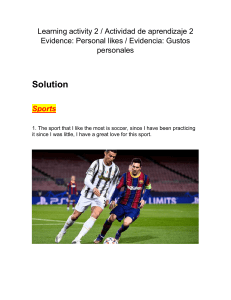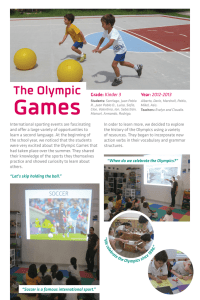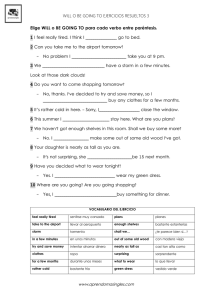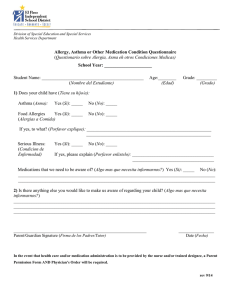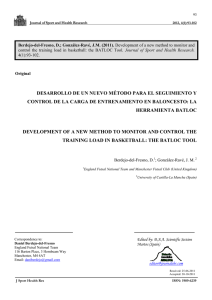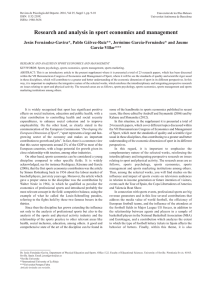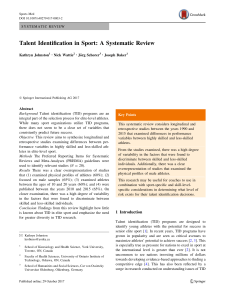Mis apuntes del Tema 11.A
Anuncio
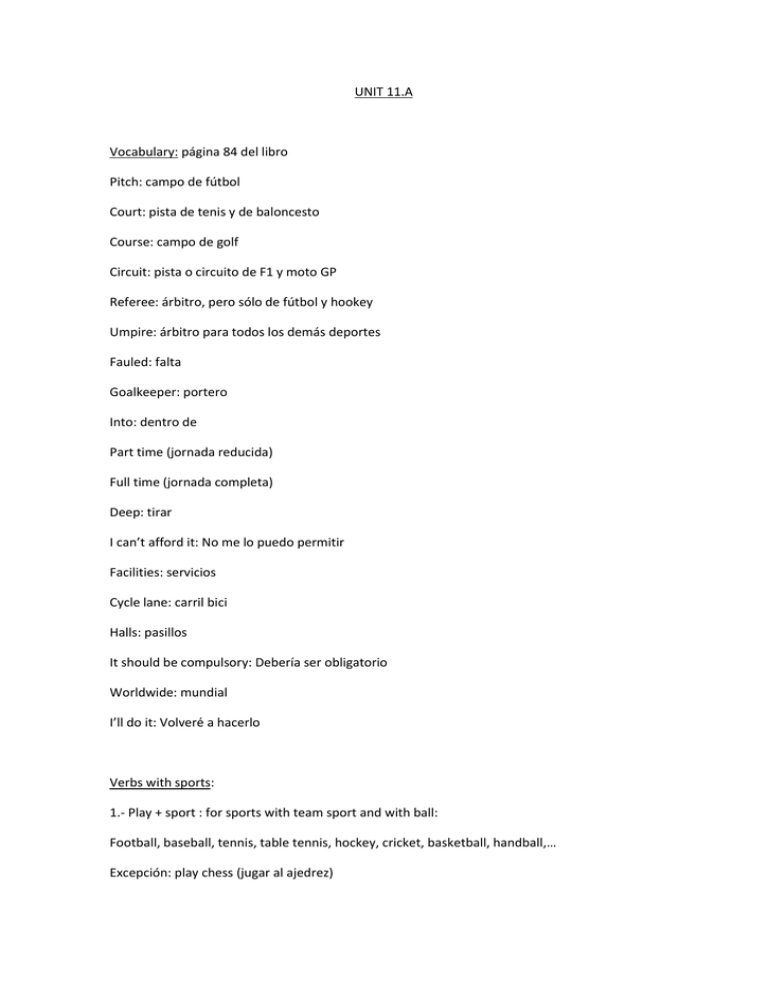
UNIT 11.A Vocabulary: página 84 del libro Pitch: campo de fútbol Court: pista de tenis y de baloncesto Course: campo de golf Circuit: pista o circuito de F1 y moto GP Referee: árbitro, pero sólo de fútbol y hookey Umpire: árbitro para todos los demás deportes Fauled: falta Goalkeeper: portero Into: dentro de Part time (jornada reducida) Full time (jornada completa) Deep: tirar I can’t afford it: No me lo puedo permitir Facilities: servicios Cycle lane: carril bici Halls: pasillos It should be compulsory: Debería ser obligatorio Worldwide: mundial I’ll do it: Volveré a hacerlo Verbs with sports: 1.- Play + sport : for sports with team sport and with ball: Football, baseball, tennis, table tennis, hockey, cricket, basketball, handball,… Excepción: play chess (jugar al ajedrez) 2.- Go + sport: with sports ending in –ing: Sailing, skiing, skating (patinaje), ice-skating (patinaje sobre hielo), fishing (pesca), hanting (caza), swiming, climbing (la “b” es muda), trekking, hiking (excursionismo), snowboarding, horse-riding,… Excepción: Do boxing (no se dice go boxing) 3.- Do + sport: for things a gym (cosas que se hacen en un gimnasio), athletics and martial arts (and boxing): Gymnasstics, aerobics, pilates, weight-lifting (levantamiento de pesas), fencing (esgrima), karate, judo,… Questions about sports: STUDENT A: How often do you play sports? What is your favourite sport? Are you a member of any sports team? What sports are you good at? Do you like team sports? What are your favourite team sports? Do you watch sports on TV? What sports did/do you use top lay in school? What is your favourite Winter sport? What is your favourite summer sport? What sport is the most dangerous? STUDENT B: What sport is the most expensive? Have you ever trid any extreme sport? What new sports would you like to try? What is the most popular sport in your country? Who is your favourite sportman/sportwoman? Are there any sportsmen/sportswomen in your country that are succesful worldwide? Are there good sports facilities in your town? How important is keeping fit to you? Until what age do you think sports should be compulsory at school? Do you think footballers are paid to much? Expresing place Van con el verbo to be (es un verbo de estado): The cat i son the wall : El gato está sobre el muro (pero quieto, no se está moviendo) Between: entre, en medio (no se puede sustituir por “in the middl”e, porque tiene sentido de “en el centro”). Nex to: al lado de Near: cerca = by = beside Above: encima de (sin tocar) On: encima de (tocando) Under: debajo In = inside: dentro de In front of: delante de Behind: detrás Opposite: enfrente de, frente a Expresing movement (página 162 del libro) Ya no van con el verbo to be, sino con verbos que expresan movimiento: jump, run, climb, walk, go, come, arrive… Over: encima de (en el sentido de que pasa sobre o por encima de algo): He’s jumping over the water (Saltó sobre el charco, Saltó el charco) Onto: encima de, sobre (en el sentido de que está en lo alto o en la cima de algo): The cat is jumping onto the car: El gato está saltando sobre el coche Into: en, dentro de (indicando que se entra en el interior de algo), a, hacia (indicando el paso de un sitio a otro): The cat is jumping into the car: El gatos está saltando hacia dentro del coche Coming onto: saliendo – Coming into: entrando En medios de transporte: Si son privados (coche, taxi,...), se utiliza para entrar: go into, y para salir: go out of She went into the car / She went out of the car Sin son públicos (bus, train,…), se utiliza para subir: get onto, y para bajar: get off Through: por (en el sentido de atravesar algo), a través de Around / Round: alrededor de (dando vueltas, rodeando) Across: con sentido de cruzar algo To… from…: desde… hacia… Past: en el sentido de pasar o dejar atrás algo: The dog is going past the car: El perro está dejando atrás el coche (mientras va caminando) Towards: hacia Up / down: subir / bajar Vocabulary Might: podría, puede que (indica posibilidad): I might change my mind (Podría cambiar de opinión = Puede que cambie de opinión = Quizás cambie de opinión) Lorry driver (UK) = Track driver (USA): camionero Postman /postwoman: cartero/a Throw: tirar, arrojar Kick: dar una patada Hit: golpear Jog: correr, hacer footing He’s pulling him down: Lo está tirando al suelo Pull: tirar Tight leather black trousers: ajustados pantalones de cuero negro The final countdown: La cuenta atrás Goa head: Sigue recto Turn left / Turn right: Gira a la izquierda / a la derecha Get until the forest: Ves hasta el bosque Until: hasta Go through the tres: Pasa a través de los árboles (atraviesa el bosque) Until go the finish line: Hasta que llegues a la meta (hasta que llegues al final) Start line: Línea de salida The trees which are near the hill: Los árboles que están al pie de la colina Adrenaline junkies: yonkis de la adrenalina Freedom: libertad The challenge: el reto Thrill-sekers: buscadores de emociones Rough water: aguas bravas Thrills spills: derrames de emociones (literalmente) Outdoors: al aire libre The rush: el ímpetu You have take shortcuts: Tienes que tomar atajos Steps: escalones To get the balance: conseguir el equilibrio, tener equilibrio A white-water course: pista o circuito de agua bravas Test myself: probarme a mí mismo Test themselves: probarse a sí mismos Railings: vallas Parkour: deporte de salto de mobiliario y edificios urbanos Coach = trainer: entrenador Crashed: chocar Scored the goal: marcar un gol Beating: derrotados Composition Write about your favourite sport What is the name of the sport? When do you play it? How do you feel after playing it? (If you are not keen on doing sports you can write about the most popular watching sports in your country). Now write about the last time you went to or saw an exciting sporting competition. I am not fond of sports, but there is one that I like practicing, specially, in spring and in autoumn. This is the hiking. Going hiking is a great way to get out and you can do it in your free time with a minimal effort. It is true that there are a lot of hard hiking trails, but it can also be a fun walk around your local park or neghborhood for a few hours on a Saturday or Sunday morning. I prefer hiking trails of intermédiate difficulty. I usually leave home by car early in the morning to the villaje where the hinking trail starts. I park there and I begin to walk. When I’m tired, I stop to rest (or to drink, or toe at). Once I regain my srength, I continue walking to my destination. When I reach the end (that it is the starting point) I’ve spent some wonderful hours seeing ladscapes, drinking in fountains, wetting my feet into rivers,… I feel very well and with a fresh mind. This sport isn’t a competitive sport. I don’t really like competitive sports except ice-skating. I watched the 2015 World Champion of Ice-skating. It was very exciting and the Spanish sportman Javier Fernandez won the champion of Men’s singles, staying behind the Japonese competitor and the rival of Kazakhstan. The worst of this sport are the players’ suits. There are always awful!
